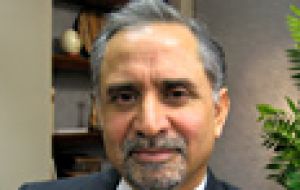MercoPress. South Atlantic News Agency
World Bank warns the US about consequences of dollar liquidity
 Vikram Nehru, World Bank's chief economist for Asia-Pacific
Vikram Nehru, World Bank's chief economist for Asia-Pacific Surging capital inflows threaten Asia's economic stability, the World Bank warned after Treasury Secretary Timothy Geithner sought to draw the venom from a global row over currencies by vowing not to devalue the dollar.
The World Bank buttressed the argument made by China and others that US policies are sending a wave of cash flowing into higher-yielding emerging markets, undermining their export competitiveness and pumping up inflation and asset bubbles.
“We are seeing an effort by developing East Asia to deal with the large amounts of liquidity driven in very large part by the monetary policy easing in the United States,” Vikram Nehru, the bank's chief economist for Asia-Pacific, told reporters in Tokyo.
Nehru, presenting a semi-annual report, urged policymakers to learn the lessons of the 1997/98 Asian financial crisis, when an influx of footloose global capital inflated property and equity prices, only for them to collapse when the money flows reversed.
“The authorities in East Asia need to take adequate precautions to ensure that they do not repeat the same mistake twice in slightly over a decade,” the report said.
While capital controls were not very effective in controlling long-term investment flows, Asian countries had an array of instruments to deal with rising inflows, the World Bank said.
“If this liquidity abundance is sustained and increases, I think they are going have to take further action,” Nehru said.
Thailand introduced a withholding tax on foreign purchases of government bonds last week, and Brazil on increased an existing tax on foreign bond buyers to 6% from 4%.
Foreign investors in Brazil will also have to pay more tax to trade currency derivatives, blamed in part for driving up the Real, the country's currency, to a two-year high.
“Our objective is to reduce foreign investment into Brazil,” Finance Minister Guido Mantega told reporters.




Top Comments
Disclaimer & comment rules-

Read all commentsIf the US does what the World Bank suggests, my country's economy will be in serious trouble, as usual :) I wonder what President Cristina Fernández de Kirchner will do about it. She's such a bad ass lol she doesn't know where she's going. Stupid woman.
Oct 20th, 2010 - 01:46 am 0Commenting for this story is now closed.
If you have a Facebook account, become a fan and comment on our Facebook Page!